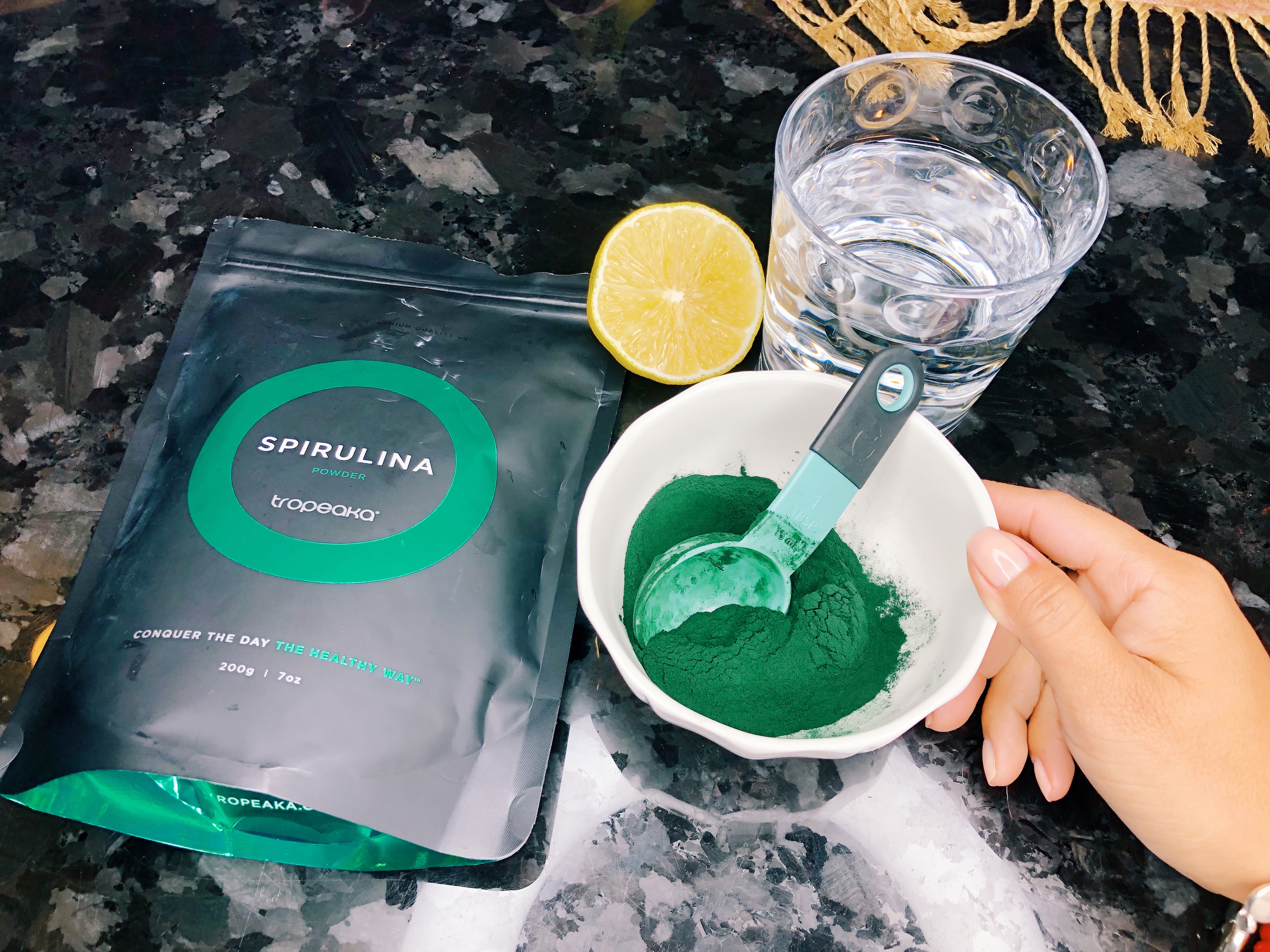Hi Besties! Today I want to make this post about spirulina; I know you’ve heard it everywhere! Spirulina is now a world-famous superfood every blogger, youtuber and health enthusiast includes it in their diet. But, why? What is Spirulina? AND most importantly, why do we need it in our lives? Well! we’ll talk about it right now, so keep reading bestie!

Spirulina goes way back to ancient times! The Aztecs harvested it in Central Mexico and consumed it because of it’s dense composition of nutrients. Now, time has passed and it became known to us (social media people) when NASA suggested spirulina could be grown in space and used as nutrients for astronauts.
At first it was thought to be a regular plant because of it’s ability to do photosynthesis but eventually it was classified as a cyanobacteria, which is a family of single-celled microbes that are often referred to as blue-green algae.
So! This blue-green algae, called Spirulina is dense in nutrients, antioxidants and minerals. What nutrients does it have you may be asking yourself?
A single tablespoon (7 grams) of dried spirulina powder contains:
- Protein: 4 grams
- Vitamin B1 (thiamine): 11% of the RDA
- Vitamin B2 (riboflavin): 15% of the RDA
- Vitamin B3 (niacin): 4% of the RDA
- Copper: 21% of the RDA
- Iron: 11% of the RDA
- It also contains decent amounts of magnesium, potassium and manganese and small amounts of almost every other nutrient that you need.
- Also contains omega 6 and omega 3, which are the good kind of fatty acids we want in our diets.
Fun Fact about Spirulina
The quality of protein in spirulina is considered to be as good as eggs! Often, vegans use spirulina as a source of protein in their diets. So for all my vegan besties out there, add spirulina to your smoothies and food!
The uses!
Spirulina is said to help with the following health issues:
- Attention deficit hyperactivity disorder
- Cancer – more research needs to be done on this one but one particular research says spirulina can help with oral cancer
- Fatigue
- High cholesterol
- High triglycerides
- Viral infection
- Malnutrition
The benefits everyone loves!
- Higher energy due to it’s iron, antioxidant, and protein concentration
- Lower cholesterol through the antioxidants work as anti-inflammatory which help reduce the levels of oxidation damage in our body
- Less chronic diseases due to the anti-inflammatory support from antioxidants which help reduce oxidation in our body structures
- Less nasal allergies – A study showed that 2 grams of spirulina a day can help reduce mucus, sneezing, itching and congestion.
- Lower blood sugar – Some studies shows it can beneficial for type 2 diabetes but more research is needed for a final conclusion!
- Improve muscle strength and endurance through decreased muscle fatigue and postpones the point of exhaustion! This is why often you see people adding spirulina to their protein shakes as a snack before or after their workouts.
Side effects to look out for!
- May cause insomia as it has properties to increase your energy – I suggest only using spirulina supplements in the morning so you don’t end up like me! Laying awake until 2am because I added spirulina to my shake at night. Bad. Bad. Bad.
- May cause headaches because the taste is pretty strong. Remember, it’s an algae so… it tastes pretty fishy. Start small, a dash here and there and then move up to a half a teaspoon and so on. Find the amount that tastes good to you.
- We need to be careful about where we buy spirulina; spirulina grown in the wild can absorb toxins from water, pollutants and heavy metals; These toxins can cause liver damage, nausea and vomiting. Most spirulina sold in the United States is grown in laboratories and safe from toxins; but ideally, we need to look for natural spirulina.
Talking about the quality of spirulina! The one we have at our house is by Tropeaka; a company based in Australia. It grows in China and packaged in Australia. I have recently started incorporating it in my diet but my sister has for about a year and she has not had any problems with this brand! Here’s where you can find it!
Why I’m using Spirulina in my diet
To be completely honest, adding spirulina to my shakes seemed like something cool and healthy to do – I was convinced it would add some sort of benefit but I didn’t exactly know how it could improve my life.
I started adding it to my protein shakes and it worked well until I changed my shakes to night time; I crave sweets the most in the afternoons and evenings so now, I drink my protein shake in the late afternoon. Well, one day I had a protein shake at night, around 9pm and added a bit of spirulina – I could NOT fall asleep for the life of me. Last time I looked at my phone was around 2:30am. The next morning, I started researching about spirulina. That’s when I typed onto google: What is spirulina? and that’s how this post about.
So, after learning about the benefits; I will continue to use spirulina to really see the benefits in my body.
How I’m using it
- I’m using it obviously for the anti-inflammatory benefits that help prevent chronic diseases but I also want to use it for: nasal allergies and increased energy!
- I’m going to add it to my pre-workout (I use the grape flavor!) as I will not commit the same mistake of taking it at night. And if I ever have my protein shake (love the vanilla & chocolate!) in the morning, then I’ll add it to that.
- I’m starting slow with my intake because like I said, the taste is pretty fishy but I plan to go up to 1 teaspoon which is 4.2 grams. The recommended dosage is anywhere from 3 grams – 7 grams a day.
There you have it, bestie! All you need to know about spirulina; benefits, how to use it and side effects!
I hope you like these kind of posts! They are a bit more informative but I think it’s necessary to know the ins and outs of what we are putting into our bodies for better and safer results 🙂
If you like this post please tap on the little heart below and make sure to subscribe to never miss a post PLUS receive a monthly personal email from me, where I talk about things not discussed on the blog 🙂 Yay!
Ok, that’s it! Thank you for reading and I will see you on Sunday for my next post!
PS- Water is extremely important for our bodies, too! Here are some tips on how much water you should be drinking. Enjoy!









